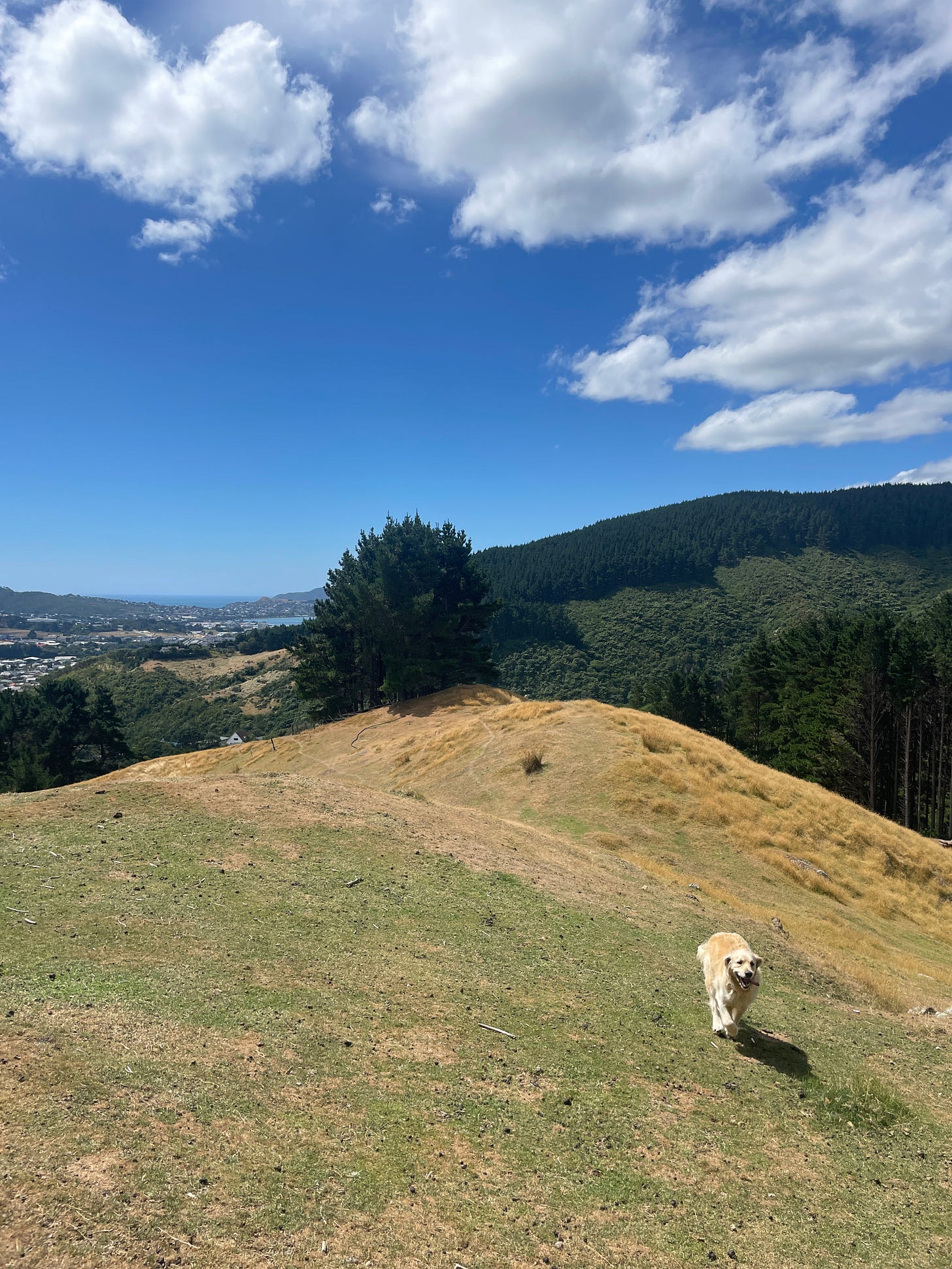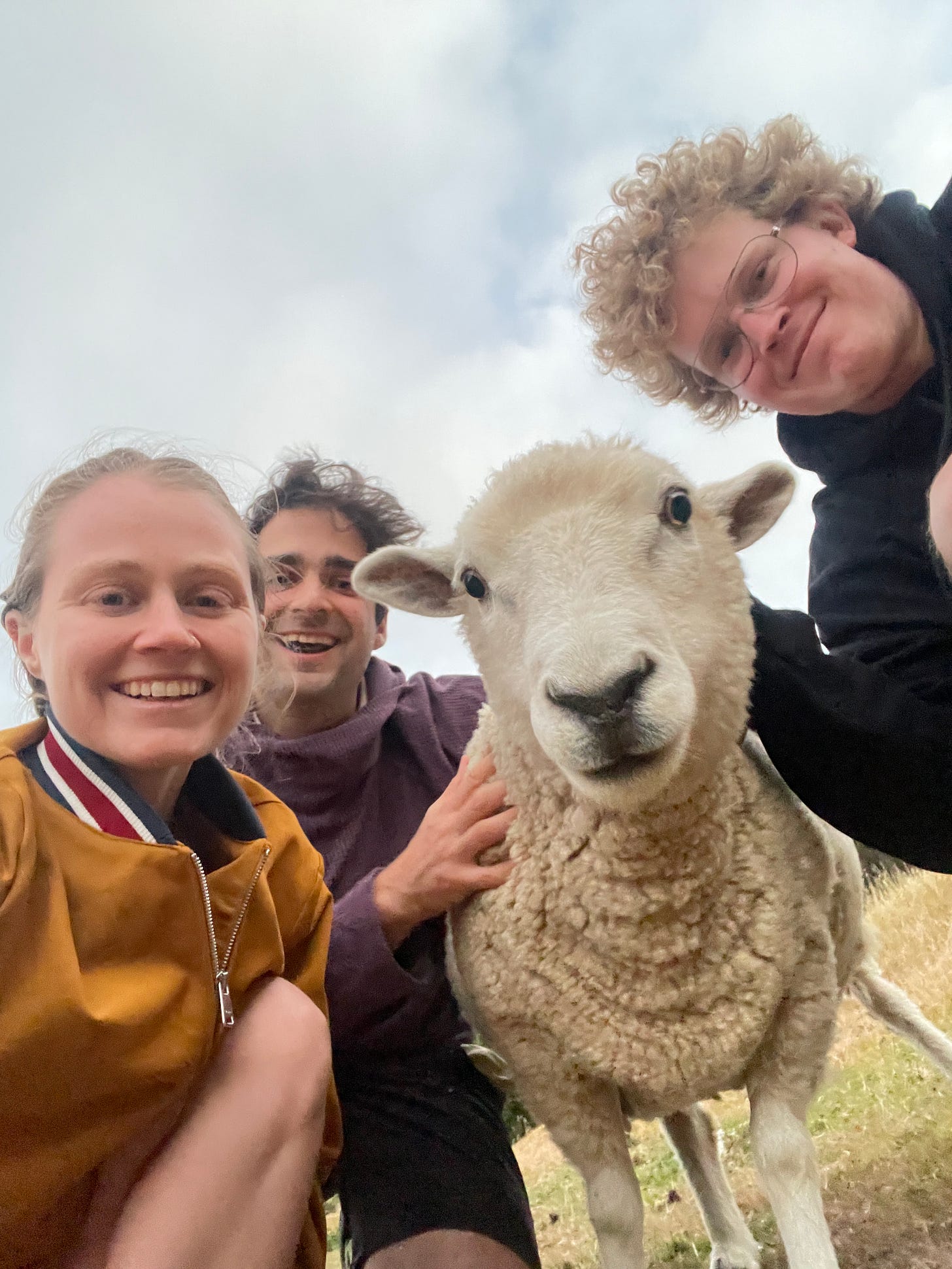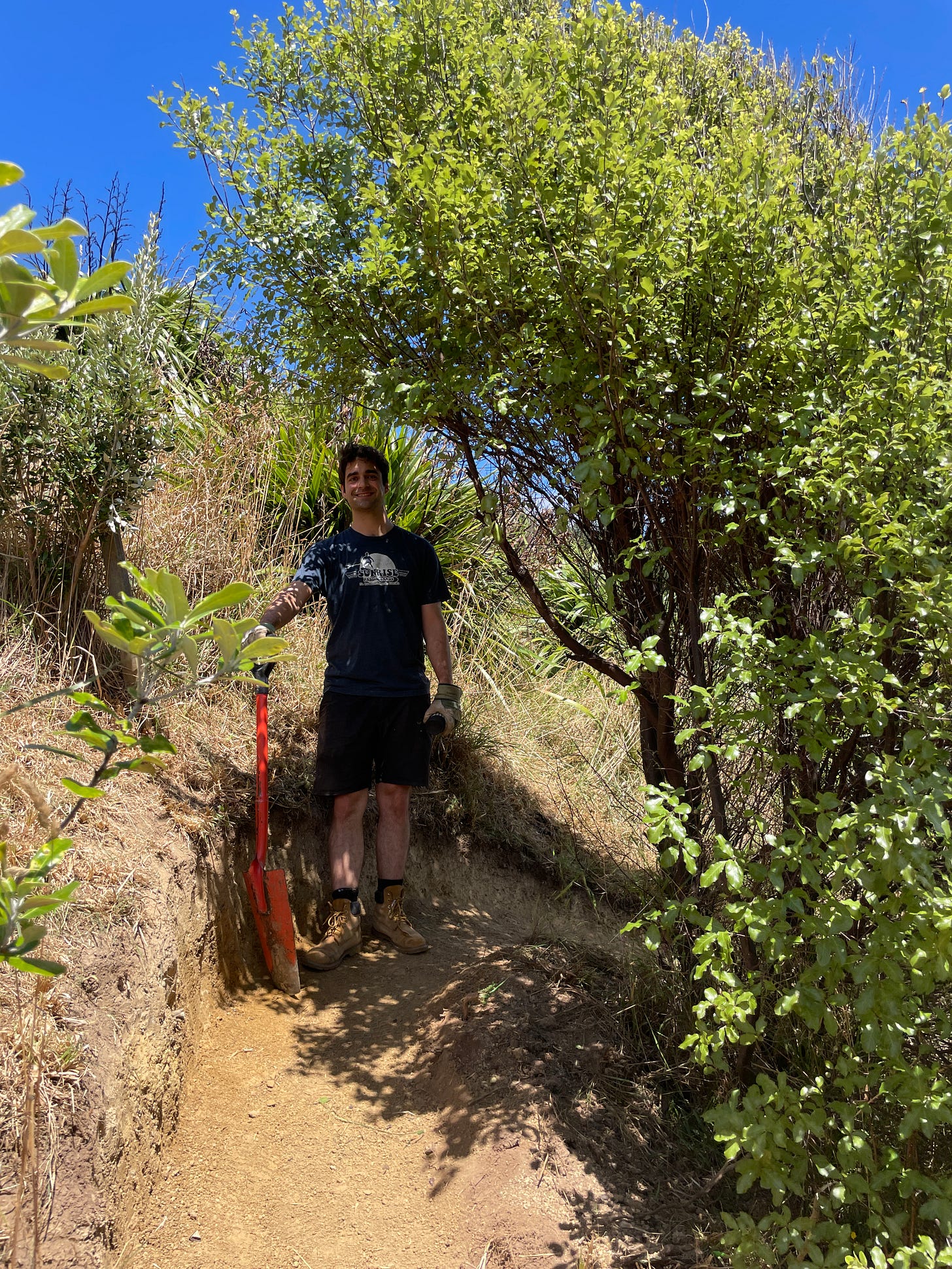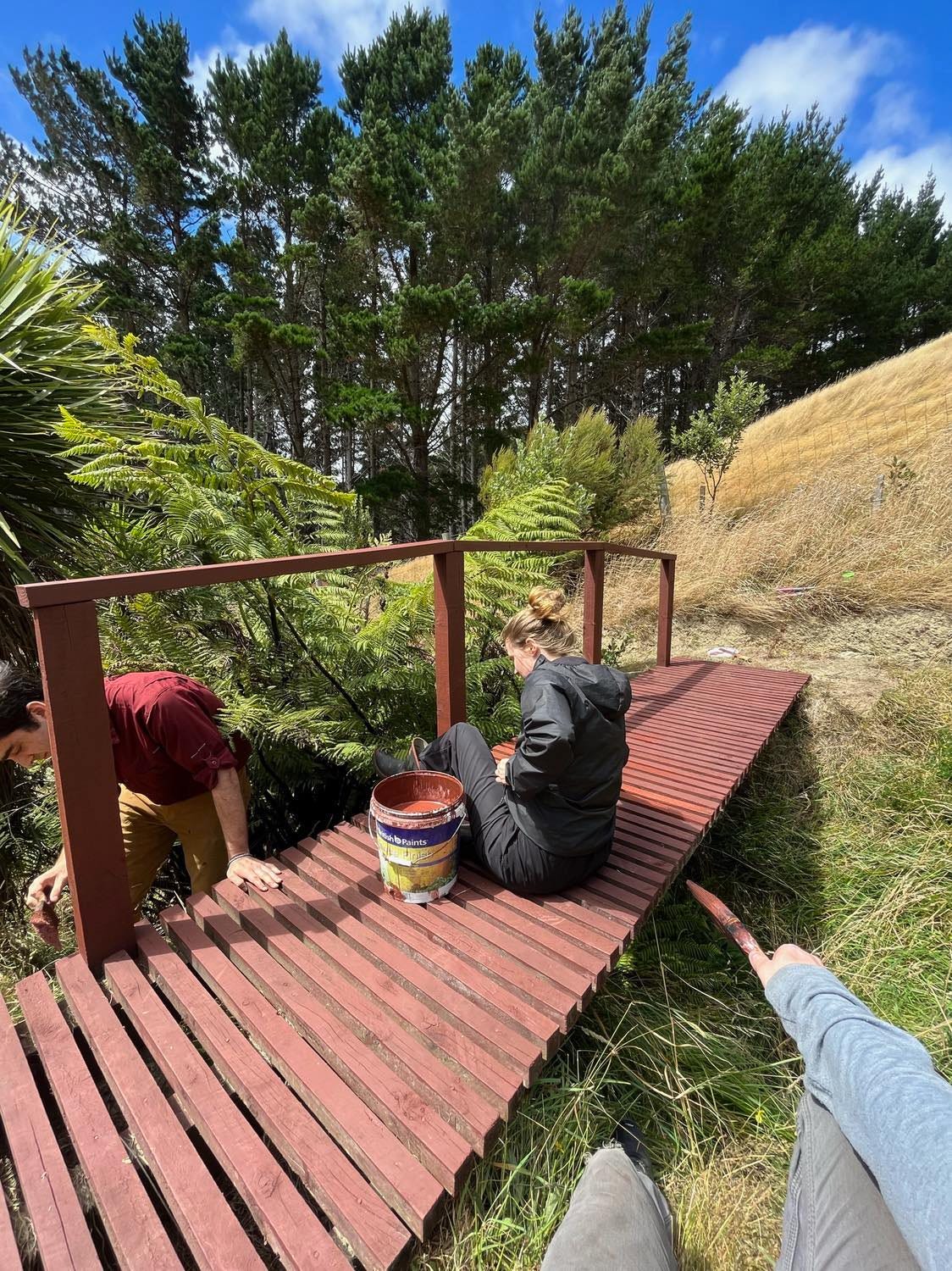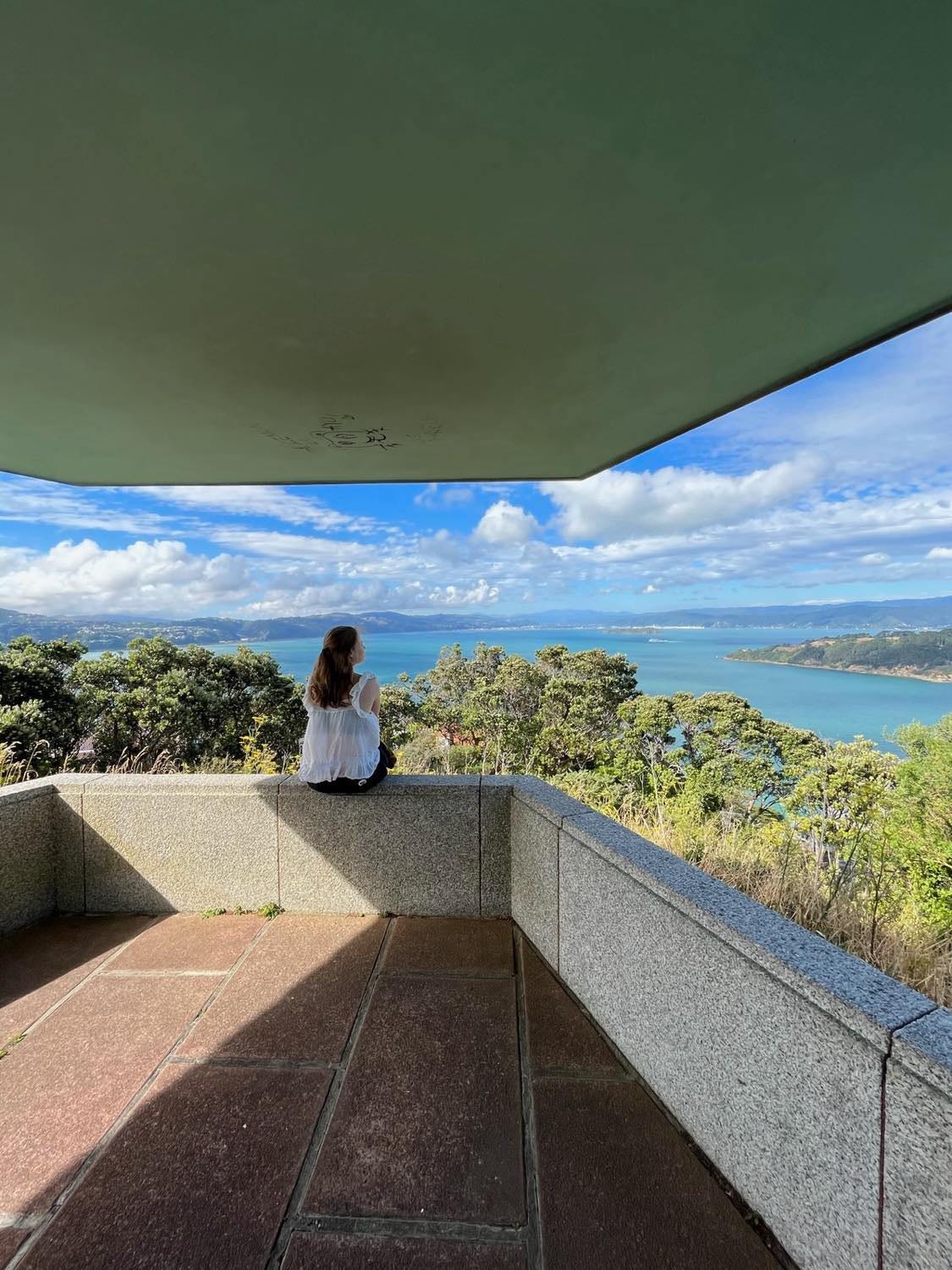Hi from Picton, the point of entry at the northern tip of the South Island! We arrived here Monday after a ferry ride through the beautiful Marlborough Sounds. The Sounds are a series of seemingly infinite coastal inlets accessible only by boat. They are also known for producing a lot of savignon blanc!
After a busy first week of WWOOFing in Auckland followed by a North Island road trip, we were ready for some much needed downtime. We couldn’t have asked for a better job than dog sitting three golden retrievers for a weekend! Each day, Chris and Chace watched at least three movies, and I made at least three phone calls to friends and family.
We stayed on a 16-acre hobby farm in the hills north of Wellington, which is truly off-leash paradise for dog walks.
The farm also has about twenty sheep who come to the gate by the house in the late afternoon each day to beg for sheep pellets. We particularly bonded with one sheep, Annie, who is quite comfortable around humans given that our host had to bottle-feed her as a lamb!
We are still so grateful to be kicking off this year by WWOOFing. It feels like a setup where both parties feel like they’re getting the better end of the deal! Our hosts appreciated free pet care, help on projects around the farm, and company from younger people. We enjoyed getting to stay in a beautiful house overlooking the valley as a launching off point to enjoy the city of Wellington, as well as the company and new experiences!
After our hosts returned from their trip, we worked on the farm for another week. During this time, we:
Dug out thistle and gorse
Moved firewood
Cleared and widened paths and trails around the farm (more commonly called “tracks” here)
Created a new section of track where plants had grown too large around the old one
Painted bridges in the section of the farm where they are reintroducing native plants
Despite the fact that we are not officially employed yet, the theme of work ethic has come up repeatedly. Our hosts often reflect on past WWOOFing experiences, noting that they prefer older WWOOFers who are more independent and capable. In a funny but low-key scathing comment, one of them said that French WWOOFers love the idea of working outdoors, but are completely disinterested when you actually try to get them to do it. They mention that Americans are particularly hard-working – thankfully, we’ve gotten all positive feedback so far!
Being perceived as hard-working while living abroad is certainly an asset. At the same time, I have been reflecting on what it means to have qualities that you value in yourself despite developing them in response to negative personal experiences or societal pressures. I’d like to believe that I developed a good work ethic because I enjoy learning, genuinely care about doing meaningful work, and want to be helpful. However, my experiences in American office culture warped my relationship to work ethic and shifted these desires into something more anxiety-driven. Much has been written about “productivity theater,” and the pressure on workers to constantly demonstrate they are working rather than actually just, well, working. Time spent doing “deep work” is rarely valued or incentivized, while time spent in front of the screen to prove you worked the requisite number of hours is (increasingly, back in the office despite a lack of evidence that this increases productivity). I often expended more energy on being perceived as compliant and valuable to an organization than advancing my skills or contributing to impactful projects.
So to what extent should I feel proud of being a hard worker, and to what extent should I feel frustrated to have become so in a system that cares more about proving my position isn’t a waste of taxpayer dollars than actually enabling me to do my job of improving quality of life for community members? Or in a system that doesn’t compensate people who have to work much harder than me with a living wage? Do Americans value hard work, or have people, especially those who have been marginalized, always worked hard because it’s what they had to do to survive? How do we value our own and other people’s hard work without validating systems that have long mistreated and exploited workers?
While I can’t claim to have answers to all of these questions, it has been refreshing to have my relationship to work ethic recalibrated through WWOOFing. At times, I have caught myself slipping into American office culture patterns that are irrelevant to a work exchange. One day, we worked extra hours so that we could enjoy time off on the weekend. When we wrapped early the next day, I was worried our hosts would accuse us of slacking off or say we weren’t allowed to leave. I had to remind myself that a successful work exchange is not monitored or evaluated in the same way as my past work experience. I had to shift my mindset from one of performed transaction to one of mutual reciprocity.
WWOOFing has helped restore a work ethic grounded in a desire to build positive relationships, develop new skills, and do a good job on something that makes someone else’s life easier. Perhaps most importantly, it is reinforced by seeing how my efforts are translating to tangible, meaningful outcomes. Of course, all of these factors can and should be present in any type of work, but are often lost in the world of KPIs and whether you responded to a Teams chat quickly enough. I hope if I return to traditional office work, I’ll have thicker skin to tune out these stressors and feel confident that my own work ethic, quality, and commitment speak for themselves. I also hope I can cultivate a career where the relationship between my effort and my impact feels more direct and less out of my control. For now, I’m finding satisfaction in the rhythms of WWOOFing.
We typically tried to complete our work in the morning so that we could take the train into Wellington in the afternoon. While in Wellington, we enjoyed walking around the shops on Cuba Street, taking the cable car, seeing views of the bay, and attending comedy shows at New Zealand’s Fringe Festival. We also visited an animal sanctuary where we met a “living fossil,” the tuatara!
People keep telling us just how much more beautiful the South Island is than the North, but we have been astounded by the views and experiences in each place we have visited so far. Our only complaint was the wind, but as they say, you can’t beat Wellington on a good day!
Now we are in Picton for a few more days before we take another scenic train down the coast to Christchurch. We’ll spend a few days there before doing a rental car relocation (a great way to get around affordably) to Queenstown, camping in/near national parks along the way. Then we plan to stay at a backpackers (alternate name for hostels here) for several days to meet people and gather information on potentially getting some jobs in the South Island for the next month or two! Until next time!






